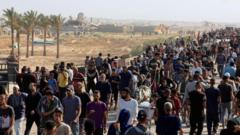The killing of ten people, including six children, at a water distribution point has ignited outrage and calls for an end to the violence in Gaza.
Father's Heartbreak After Israeli Strike Kills Son at Water Point in Gaza

Father's Heartbreak After Israeli Strike Kills Son at Water Point in Gaza
A father's anguish highlights the humanitarian crisis as Israeli airstrikes result in tragic loss of children in Gaza.
Mahmoud Abdul Rahman Ahmed is filled with grief after his son, Abdullah, was killed by an Israeli strike while merely seeking water in the Nuseirat refugee camp. On that fateful Sunday morning, Abdullah had waited in line among other thirsty children and families, jerrycans in hand, hoping for a sip of water that had become increasingly scarce. "That area was home to displaced people facing the dire consequences of the war, struggling under a relentless siege," Mahmoud told a local journalist.
Just moments after the children had gathered at the water distribution point in the densely populated camp, Israeli warplanes unleashed their deadly munitions without warning. Mahmoud’s chilling words captured the moment: "They stood there with empty stomachs, empty jerrycans, and thirsty lips," as tragedy struck. He urged for international intervention to halt Israel's prolonged aggression.
Graphic video footage verified by the BBC showcased the chaos following the strike in New Camp, where panic erupted. Visuals depicted a destroyed site and the immediate aftermath, with distressing scenes of parents attempting to rescue their children from the debris. Al-Awda hospital confirmed that ten lives were lost, including Abdullah and five other children, while sixteen others were left injured.
In response, the Israeli military asserted they had been targeting a Palestinian Islamic Jihad operative but admitted a "technical error" in their strike led to the unintended civilian casualties. The military expressed regret regarding the incident, which is reportedly under investigation. Mahmoud, however, suggested that Israel's actions were a calculated move to demonstrate control even over resources as vital as drinking water.
The humanitarian situation in Gaza continues to deteriorate, with significant water shortages exacerbating daily survival challenges. The UN notes that many families receive far less than the emergency requirement of 15 liters of water per day, describing the situation as a "human-made drought crisis."
Accountability was called for by humanitarian groups, with Sam Rose from the UN agency for Palestinian refugees decrying the loss of life among innocents as representative of larger systemic issues within the ongoing conflict. He remarked, "Every death is a tragedy... but this one is particularly emblematic."
Near simultaneous airstrikes last week claimed the lives of ten children and three women waiting for aid at a clinic in Deir al-Balah; human tragedies that are becoming all too frequent in the region. The UN's Executive Director of UNICEF condemned these incidents as "horrific," demanding a reassessment of the rules of engagement from the Israeli side to ensure compliance with humanitarian laws.
The United Nations Security Council is set to convene soon to address escalating concerns regarding the plight of children in Gaza, driven in part by a UK request. However, Israeli representatives maintain that the blame lies with Hamas, claiming the organization exploits children as shields in the conflict.
Mahmoud, reflecting on the urgency of the situation, expressed a profound sense of helplessness, stating, "This war must end. We are civilians, and we need protection like anyone else."
Just moments after the children had gathered at the water distribution point in the densely populated camp, Israeli warplanes unleashed their deadly munitions without warning. Mahmoud’s chilling words captured the moment: "They stood there with empty stomachs, empty jerrycans, and thirsty lips," as tragedy struck. He urged for international intervention to halt Israel's prolonged aggression.
Graphic video footage verified by the BBC showcased the chaos following the strike in New Camp, where panic erupted. Visuals depicted a destroyed site and the immediate aftermath, with distressing scenes of parents attempting to rescue their children from the debris. Al-Awda hospital confirmed that ten lives were lost, including Abdullah and five other children, while sixteen others were left injured.
In response, the Israeli military asserted they had been targeting a Palestinian Islamic Jihad operative but admitted a "technical error" in their strike led to the unintended civilian casualties. The military expressed regret regarding the incident, which is reportedly under investigation. Mahmoud, however, suggested that Israel's actions were a calculated move to demonstrate control even over resources as vital as drinking water.
The humanitarian situation in Gaza continues to deteriorate, with significant water shortages exacerbating daily survival challenges. The UN notes that many families receive far less than the emergency requirement of 15 liters of water per day, describing the situation as a "human-made drought crisis."
Accountability was called for by humanitarian groups, with Sam Rose from the UN agency for Palestinian refugees decrying the loss of life among innocents as representative of larger systemic issues within the ongoing conflict. He remarked, "Every death is a tragedy... but this one is particularly emblematic."
Near simultaneous airstrikes last week claimed the lives of ten children and three women waiting for aid at a clinic in Deir al-Balah; human tragedies that are becoming all too frequent in the region. The UN's Executive Director of UNICEF condemned these incidents as "horrific," demanding a reassessment of the rules of engagement from the Israeli side to ensure compliance with humanitarian laws.
The United Nations Security Council is set to convene soon to address escalating concerns regarding the plight of children in Gaza, driven in part by a UK request. However, Israeli representatives maintain that the blame lies with Hamas, claiming the organization exploits children as shields in the conflict.
Mahmoud, reflecting on the urgency of the situation, expressed a profound sense of helplessness, stating, "This war must end. We are civilians, and we need protection like anyone else."




















